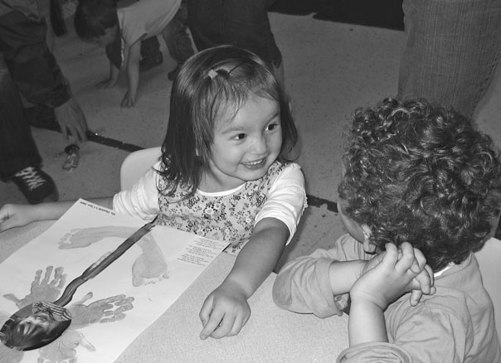The No-Cry Separation Anxiety Solution: Gentle Ways to Make Good-bye Easy from Six Months to Six Years (23 page)
Authors: Elizabeth Pantley
Tags: #0071596909

Solving Specifi c Separation Situations
117
•
Suggest a unique sleeping place.
If, at the sleepover, the chil-
dren sleep in regular beds in a bedroom, it may be a little too much
like home but different enough to cause homesickness. A better loca-
tion for a sleepover is often in sleeping bags in the family room or
on the fl oor in a makeshift tent. The uniqueness of the location can
help overcome sleeptime worries.
•
Have a call-home plan.
Most children feel better if told they
can call you to come home by a certain time of night. They can tell
the host’s mother, “I don’t feel good. I’d like to call home,” which is
true
s
ince “not feeling good” covers emotional suffering as well as
physical pain. You can even have a code phrase for your child to say if
he’s changed his mind and wants to come home. Talk over the event
the next day and let your child know that he did well by trying and
staying as long as he did. By avoiding negative feedback about abort-
ing the sleepover plan, you encourage him to try again.
Bon Voyage! Planning a Successful
Adults-Only Vacation
We have an opportunity to stay at a friend’s home in
Hawaii—just the two of us. Grandma and Grandpa have
offered to watch our children for the week. I have mixed
feelings. I’m excited about the trip but fi nd myself sick with
worry about the kids’ separation anxiety—so much so that
I’m actually considering canceling our trip!
Once you become a parent, every decision is colored by your relation-
ship with your children. You are certainly not the fi rst person to con-
sider passing on a wonderful opportunity to avoid causing your little
ones emotional stress. However, if you have set up loving, responsible,
willing, and familiar caregivers for your children, don’t let uneasiness
prevent you from taking advantage of this chance. It may take a day
or two and several phone check-ins for you to relax, but this may
likely turn out to be a wonderful time for everyone involved.
118 The No-Cry Separation Anxiety Solution
Mother-Speak
“When I told my daughter I was going out of town for a few
days and Nana and Papa were coming to visit, she was very
upset. I reminded her that they had stayed with her many
times and told her stories about what they had done. By the
time Nana and Papa arrived bearing cookies, she had forgot-
ten about her sadness! After I said my good-byes, I had her
start a game of hide-and-seek with Nana and her little brother,
so they were all occupied while I slipped easily out the front
door.”
—Sarah, mother of three-year-old Alasia and
one-year-old Mattias
•
Find a creative way to say good night.
Lots of children’s books
use the moon or stars, common objects that everyone sees at night,
as a way to pass good nights over the miles. The potential problem
with this is that your children may go to bed before dark or may not
be able to see the moon or stars on cloudy nights. It’s best to fi nd a foolproof method of delivery for your special good-night message.
Here are a few ideas:
— Frame a family photo to place at your children’s bedsides.
— Record a good-night song or message to be heard at bedtime.
— Give your children a card with a “sweet dreams” message writ-
ten on it.
— Put one of your shirts on a stuffed animal for bedtime cuddles.
Have the person in charge handle this good-night ritual very early
in the bedtime routine and not right before lights out, when it might
bring a rush of separation anxiety that you don’t want occurring right
before sleep.
•
Determine the emotional value of phone calls.
Some children
love to receive phone calls from parents who are away. Others fi nd it
causes them to miss their parents even more. If your children enjoy
calls, make them brief and cheerful. Tell your children something
interesting. Avoid general questions like “How are you doing?” and
instead ask specifi c questions about something they have done, such
as “Grandma told me you baked cookies. What kind did you make?”

Solving Specifi c Separation Situations
119
Josephine, three and a half years old, and friend
•
Make a photo book.
Before the event, put together a photo
album with pictures of the family doing fun things together. Your
children can keep this album as their own to look at whenever they
like.
•
Make a storybook recording.
Tape record yourself reading
books to your children. For younger children, you can read from pic-
ture books. Use a small bell or other sound to signal page turning.
That way your little ones can look at the pictures as your voice does
the reading.
You can plan ahead and record your daily reading time—this can
then be left with your children to listen to whenever they like. Chil-
dren do like to hear stories more than once, and as a bonus, when
they hear their own voices on the tape along with yours, it will con-
jure up memories of when you made the recording together.
Bedtime is a logical choice for playing the tape, but it is not always
the best time, because hearing your voice could create stronger feel-
ings of missing you. Then again, some children are comforted by a
parent’s voice at bedtime. Have your caregiver gauge the best time for
this recorded storytime for your children.

120 The No-Cry Separation Anxiety Solution
•
Set up playdates and activities in advance.
Prior to leaving,
arrange to have a friend come for a visit, or if your children have
done it before, arrange for them to go to a friend’s house for a play-
date. Check into any local events that might add some fun to the
time you are gone. If the caregiver can take your children to the zoo,
a puppet show, bowling, or some other event, it can add a distracting
bit of fun and a refocus of emotion toward positive things.
•
Instigate a creative activity.
Leave supplies for the caregiver to
help your children create something for you while you are away. A “wel-
come home” poster or a booklet of pictures about the time you’ve been
away are great ideas that can take many days to create and will get
your children excited about making something special for your return.
They might also bake cookies or some other treat on the day before
you arrive home. Doing something for others gets children thinking
toward the joy that they will be providing you when you return.
Military Duty: When a Parent Is Deployed
My husband has been called to join his unit. How can we get
our children ready for this, and how do I help them deal with
missing their daddy while he is away?
Deployment is a challenging time for parents and children. Little
ones don’t really understand what’s happening—but they do know
that Daddy or Mommy is leaving. Young children have little real
concept of time, so they don’t comprehend when their missing parent
will return, and it may seem like a long, long time until then.
It’s helpful to take advantage of the support you can get from other
military spouses, so you can share ideas. In addition, if you can con-
nect your children with other military kids, either in person or as pen
pals, then your children will feel their situation is normal. They’ll
also gain support from these friends. Check with the offi ce of your
spouse’s branch of the military and ask if there are family programs
that can provide support and ideas for you.
Solving Specifi c Separation Situations
121
Here are things you can do to get your children ready for a parent’s
leaving.
•
Give them a simplifi ed version of the facts.
They don’t need all
the details, but they do need to know that their parent is leaving to do
an important job, to help other people, that he will be back, and that
they will be taken care of by other capable people while he is away.
•
Acknowledge your children’s emotions.
Children may have
confl icting feelings. Let them know that it’s okay to be sad, scared, or
angry about this. But also let them know that they can work through
the feelings and still be happy and have fun—even when they are
missing Daddy or Mommy. Don’t assume these feelings are there,
though. Ask questions rather than acting on what you suspect may
be the case, so you have a clear understanding of your children’s feel-
ings and can address them accurately.
•
Create a visual time line.
If you know when the traveling par-
ent will return, create a countdown calendar. This can be an actual
calendar, a bulletin board with a token to represent each day, or a
chain of paper clips hanging on the wall. Make it a daily or weekly
routine to update your time line.
•
Put together a Daddy/Mommy Box.
Get a big box and glue
the absent parent’s picture on the front. Have Daddy or Mommy fi ll
it with small tokens before leaving, such as plastic animals, stickers, or
lollipops—one prize for each day or week that he or she will be gone.
(Check a birthday party supply store for a variety of inexpensive token
prizes.) Make it a fun ritual for your children to gain a small prize from
the box, perhaps when you update your calendar. If the return date
isn’t specifi c, you can still have the box, just refi ll it as needed.
•
Keep daily rituals and routines the same.
Continue your typi-
cal morning and bedtime routines. Serve the same foods as usual and
play the same games. Avoid introducing anything new during this
time, if possible. Keeping these familiar touchstones in the day will
prevent your children from having to deal with too many changes all
at once.
•
Create a storybook recording.
Before a parent leaves, have him
tape-record himself reading books to your child. For younger kids,
read from picture books and label them to match the recording, ring-

122 The No-Cry Separation Anxiety Solution
Daddy Adama and Jasmyne, fi ve years old
ing a bell when you turn pages—that way your children can look at
the pictures as they do during an “in-person” reading. For older chil-
dren, read from an age-appropriate novel, or plan ahead and record
